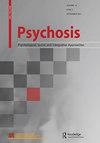The psychological therapy preferences of patients who hear voices
IF 1
4区 医学
Q4 PSYCHIATRY
Psychosis-Psychological Social and Integrative Approaches
Pub Date : 2022-08-30
DOI:10.1080/17522439.2022.2095000
引用次数: 4
Abstract
ABSTRACT Background Voice-hearing is a common, phenomenologically diverse, experience across different mental health diagnoses. Patient preferences for psychological therapies are helpful in informing treatment commissioning and provision, especially in the context of complex and variable experiences like voice-hearing. There is, however, very limited evidence as to the psychological therapy preferences of transdiagnostic voice-hearers. Methods Three-hundred and thirty-five voice hearers were recruited from secondary care NHS mental health services across England, between 2020 and 2022. Participants completed a questionnaire battery, involving a psychological therapy preference survey. Participants ranked their preferences across categories of practical, technical and relational therapy elements. Therapy preferences were examined using non-parametric ANOVAs and the significance of pairwise comparisons between different therapy elements. Results There were significant differences in all categories of preference elements. Clear hierarchies of preference were observed in therapy location, timing, delivery, and therapy approach. Preferences were evident, albeit with less clear vertical hierarchies, for number of sessions, mode, therapist qualities, and therapy focus, tasks and outcomes. Discussion Overall, participants expressed a preference for individual, face-to-face intervention of at least nine sessions, with a highly experienced therapist and a core focus on enhancing coping strategies for voice-hearing experiences.听到声音的患者的心理治疗偏好
摘要背景声音听觉是一种常见的、现象学上多样化的经历,涉及不同的心理健康诊断。患者对心理治疗的偏好有助于为治疗委托和提供信息,尤其是在语音听力等复杂多变的体验中。然而,关于跨诊断语音听者的心理治疗偏好的证据非常有限。方法在2020年至2022年间,从英格兰各地的二级护理NHS心理健康服务机构招募了三百三十五名听力者。参与者完成了一组问卷,包括心理治疗偏好调查。参与者根据实际、技术和关系治疗元素的类别对他们的偏好进行排序。使用非参数方差分析和不同治疗元素之间的成对比较的显著性来检查治疗偏好。结果各类型的偏好因素存在显著差异。在治疗地点、时间、分娩和治疗方法方面观察到明显的偏好层次。在疗程数量、模式、治疗师素质、治疗重点、任务和结果方面,偏好是明显的,尽管垂直层次不太明确。讨论总体而言,参与者表示更喜欢至少九次面对面的个人干预,由经验丰富的治疗师进行,核心重点是加强语音听力体验的应对策略。
本文章由计算机程序翻译,如有差异,请以英文原文为准。
求助全文
约1分钟内获得全文
求助全文
来源期刊
CiteScore
2.20
自引率
8.30%
发文量
36

 求助内容:
求助内容: 应助结果提醒方式:
应助结果提醒方式:


